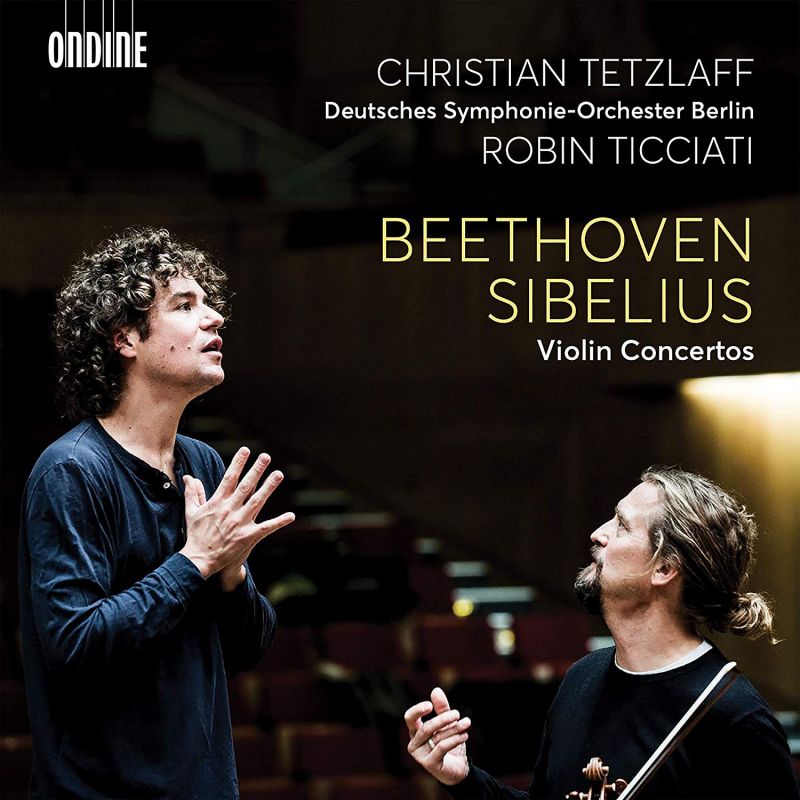BEETHOVEN; SIBELIUS Violin Concertos (Tetzlaff)
View record and artist detailsRecord and Artist Details
Composer or Director: Ludwig van Beethoven, Jean Sibelius
Genre:
Orchestral
Label: Ondine
Magazine Review Date: 10/2019
Media Format: CD or Download
Media Runtime: 71
Mastering:
DDD
Catalogue Number: ODE13342

Tracks:
| Composition | Artist Credit |
|---|---|
| Concerto for Violin and Orchestra |
Ludwig van Beethoven, Composer
Berlin German Symphony Orchestra Christian Tetzlaff, Violin Ludwig van Beethoven, Composer Robin Ticciati, Conductor |
Author: Rob Cowan
Little has changed during the intervening years, at least in principle. Listening to Tetzlaff flying side-saddle through the Concerto last November (when this superbly engineered recording was made at Berlin’s Philharmonie), often with the utmost agility, reminded me that at the work’s premiere the composer’s violinist colleague Franz Clement – who was sight-reading Beethoven’s hastily finished solo part – is said, by some, ‘to have interrupted the concerto between the first and second movements with a solo composition of his own, played on one string of the violin held upside down’. Now do hear me out on this point. Tetzlaff may at times excitedly rushes his fences, but in collaboration with Robin Ticciati and his alert Deutsches Symphonie-Orchester Berlin, he transforms aspects of what so many have treated as a sort of Holy Grail (ie loftily reverential) into a beer tankard, the sense of unhinged inebriation gaining most froth in the outer movements’ playful cadenzas, which run wild in the first movement and ratchet up extra excitement for the finale. In fact, I don’t think I’ve ever heard a more excitable account of that closing Rondo. Here, as Tetzlaff himself says in a fascinating booklet interview, ‘the seriousness or solemnity sometimes surrounding the work is [also] completely suspended’. Of course, viewed as a whole the Concerto still emerges as the mighty edifice that it is, but it’s good to have a dose of typically Beethovenian rough-and-tumble thrown in as ballast.
The first movement’s serene central section (played in tempo) allows for a welcome spot of repose and elsewhere Tetzlaff’s sweet, delicately spun tone contrasts with, or should I say complements, Ticciati’s assertive, occasionally bullish accompaniment. The Larghetto is beautifully done, its effect underlined through the sheer energy and character of the outer movements. There’s never any doubt that what you’re listening to is a real concerto, a battle of wills, more in line with Zehetmair and Brüggen (who use Wolfgang Schneiderhan’s cadenza with timpani) or Kremer and Harnoncourt (a cadenza incorporating piano) than with the likes of Perlman, Zukerman or Kennedy. Who knows: maybe this is roughly what Beethoven originally had in mind? It’s possible, even probable. One thing’s for sure: never before has this indelible masterpiece sounded more like a profound precursor of Paganini.
If Beethoven’s Concerto emerges as uncompromisingly provocative, Tetzlaff’s Sibelius also errs on the side of danger. As risk-taking performances go, this one will have you clinging to the sides of your seat. Comparing it with his Virgin recording with the Danish National Symphony Orchestra under Thomas Dausgaard is especially instructive: in the finale’s opening, the ever-attentive Ticciati follows Sibelius’s wishes by cueing a gradual diminuendo before Tetzlaff enters, whereas Dausgaard carries on pounding at full throttle. Then again, in the passage leading to the second subject (from around 0'44"), under Ticciati Tetzlaff sounds as if he’s clinging on for dear life. Sibelius throws down the gauntlet by requesting a very fast tempo and Tetzlaff rises to the challenge. I shan’t pretend that the effect is entirely comfortable (the Dausgaard option sounds marginally safer) but it’s undeniably exciting. The Concerto’s opening is candidly emotional, with imaginatively deployed varieties of attack (a Tetzlaff speciality) and Ticciati again engaging his soloist with the utmost intensity, lunging fearlessly at Sibelius’s dynamic writing, whether the deafening growl at 7'07" or the movement’s fiercely driven close. As with the Beethoven, Tetzlaff is at his lyrical best in the Adagio. Both performances sidestep interpretative convention without either offending or displacing their finest rivals. In many respects, a real knock-out.
Discover the world's largest classical music catalogue with Presto Music.

Gramophone Digital Club
- Digital Edition
- Digital Archive
- Reviews Database
- Full website access
From £8.75 / month
Subscribe
Gramophone Full Club
- Print Edition
- Digital Edition
- Digital Archive
- Reviews Database
- Full website access
From £11.00 / month
Subscribe
If you are a library, university or other organisation that would be interested in an institutional subscription to Gramophone please click here for further information.




